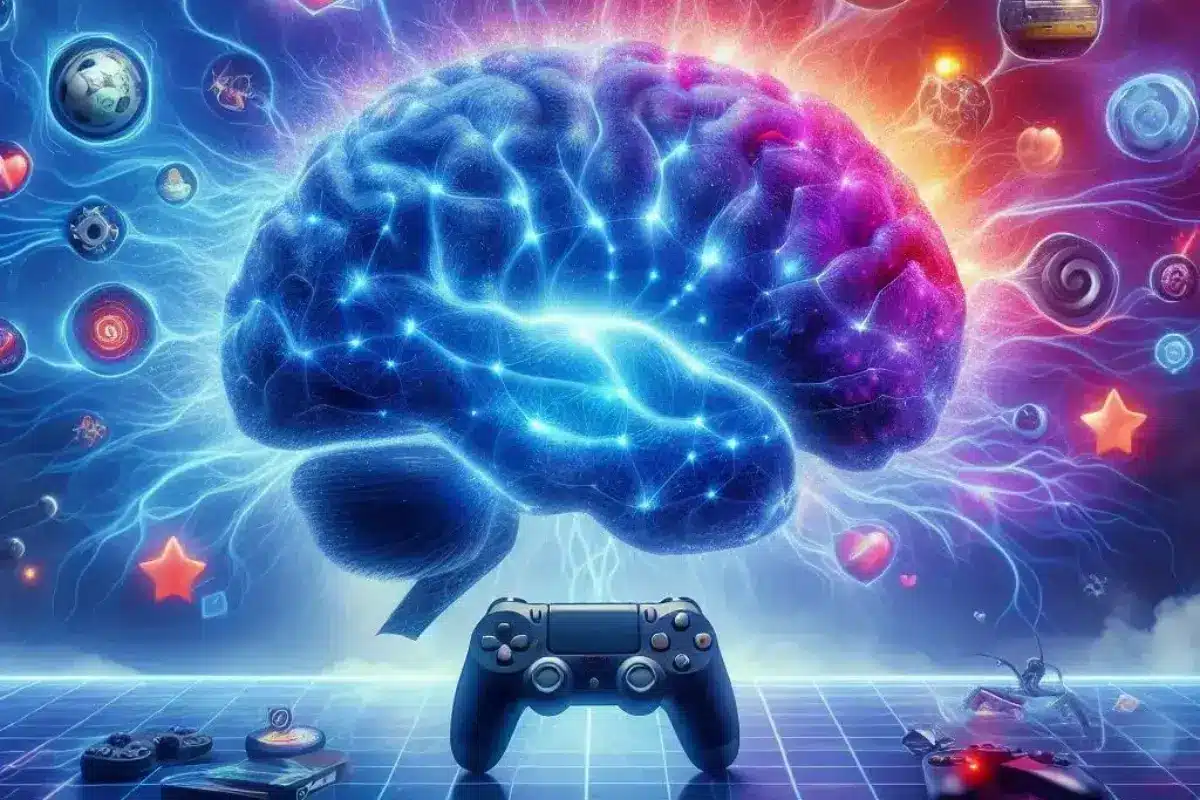It’s no secret that video games have captured the hearts of millions around the world.
Did you know that the global gaming industry is now worth over $200 billion?
That’s more than movies and sports combined!
But what is it about video games that makes them so irresistible?
The answer lies in psychology. From the thrill of winning to the connections we form online, games tap into our minds in fascinating ways.
Let’s dive into the psychology behind why we love video games, exploring what keeps us coming back for more.
1. The Allure of Immersion

How Video Games Create Immersive Experiences
Video games transport us to different worlds, making us feel like the protagonist in an epic story.
This immersion is one of the biggest reasons we can’t put the controller down.
Psychologists call this the flow state, where we’re so engaged in an activity that time seems to disappear.
For example, games like The Legend of Zelda: Breath of the Wild create vast open worlds where players can explore freely, solving puzzles and uncovering secrets at their own pace.
Similarly, the emotional storytelling in The Last of Us makes players feel deeply connected to its characters, blurring the line between game and reality.
This level of immersion isn’t accidental.
Developers carefully craft visuals, soundtracks, and narratives to pull us in.
When we’re gaming, we’re not just spectators; we’re participants in a grand adventure.
2. Reward Systems and Motivation

Why We Keep Playing: The Power of Rewards
Ever wondered why completing a mission or leveling up feels so satisfying?
It’s all about how games trigger our brain’s reward system.
The anticipation of unlocking a new achievement or collecting rare loot releases dopamine, the “feel-good” chemical.
This is why games like Fortnite keep players engaged with battle passes and daily challenges.
Similarly, World of Warcraft uses a progression system that rewards players with gear and titles, keeping them motivated to grind for hours.
The psychology of rewards explains why even simple mobile games like Candy Crush are so addictive.
Small, incremental goals make us feel accomplished, encouraging us to keep playing “just one more level.”
3. Social Connection in Gaming

Building Friendships Through Online Play
Gaming isn’t just about solo adventures—it’s also a way to connect with others.
Multiplayer games like Among Us and Call of Duty have brought people together, especially during times of isolation.
Psychologists refer to this as social identity theory, where being part of a gaming community fosters a sense of belonging.
Whether it’s teaming up with friends in a battle royale or making new allies in an MMORPG, gaming provides opportunities for meaningful social interactions.
For many players, gaming is a way to maintain friendships, meet people with similar interests, and even build lifelong connections.
In today’s digital age, gaming is as much a social activity as it is entertainment.
4. Escapism and Emotional Fulfillment

How Games Help Us Cope with Stress
Life can be overwhelming, and video games offer a much-needed escape.
Whether you’re building your dream island in Animal Crossing or conquering mythical beasts in Elden Ring, gaming provides a break from reality.
This concept of escapism is deeply rooted in psychology.
Games allow us to step into someone else’s shoes, giving us a sense of control and accomplishment that we might not always feel in real life.
Additionally, games can be cathartic, helping us release pent-up emotions in a safe environment.
For instance, many players turn to relaxing simulation games to unwind after a stressful day, while others find satisfaction in the adrenaline rush of action-packed titles.
It’s this versatility that makes gaming an emotional haven for so many.
5. Cognitive Benefits of Gaming

Video Games as Brain Boosters
Contrary to popular belief, gaming isn’t just “mindless entertainment.”
In fact, research shows that video games can improve cognitive skills like problem-solving, multitasking, and decision-making.
Strategy games like Starcraft challenge players to think several steps ahead, while puzzle games like Portal test spatial reasoning and creativity.
Even fast-paced shooters like Overwatch enhance reflexes and hand-eye coordination.
Beyond short-term benefits, these cognitive boosts can have long-term effects, such as better decision-making under pressure and improved memory retention.
So, the next time someone says gaming is a waste of time, remind them it’s actually a workout for your brain!
6. The Nostalgia Factor

Reliving Childhood Memories Through Gaming
For many of us, gaming is more than a hobby—it’s a connection to our past.
Playing classic games like Super Mario Bros. or Sonic the Hedgehog brings back fond memories of childhood.
This nostalgia isn’t just sentimental; it’s psychological. Revisiting old favorites triggers positive emotions, reinforcing our love for gaming.
It’s no surprise that remastered versions of games like Final Fantasy VII and Crash Bandicoot have become instant hits.
By blending the old with the new, these games let us relive cherished memories while experiencing them in fresh ways, creating an emotional bond that keeps us coming back.
7. Addressing the Controversies

Debunking Myths: Are Games Really Addictive?
While gaming has countless benefits, it’s also faced criticism for being “too addictive.” But is this really the case?
The truth lies in balance.
While some individuals may struggle with excessive gaming, most players use games as a healthy way to relax and socialize.
In fact, studies show that moderate gaming can have positive effects on mental health, reducing anxiety and improving mood.
It’s all about mindful gaming—setting boundaries and making sure it complements other aspects of life.
By understanding the psychology behind gaming, we can enjoy its benefits without falling into harmful habits.
Conclusion
From immersive worlds to rewarding challenges, video games captivate us in ways that few other mediums can.
They offer social connection, cognitive growth, emotional fulfillment, and even a dose of nostalgia.
The psychology behind why we love video games is as complex as the games themselves.
So the next time you pick up a controller, take a moment to appreciate the intricate design and thought that goes into creating these incredible experiences.
What’s your favorite game, and why do you love it?
Share your thoughts in the comments below—we’d love to hear from you!
Follow our social media to receive content as soon as it is released.👇

